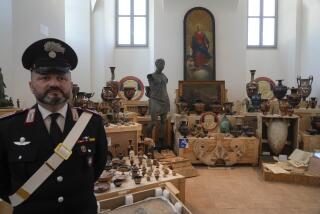Mini-Cold War, With Lawyers
- Share via
An intrigue as bizarre as any during the Cold War has been played out in the streets of Washington over an American exhibit of Russian treasures intended to foster warmer relations between the two countries. It began last week when dark sedans driven by Russians blocked an 18-wheel tractor-trailer from taking the treasures--once owned by the Romanovs, Russia’s last royal family--from Washington’s Corcoran Gallery of Art on to their next tour stop, the Houston Museum of Fine Arts.
The Russian government says its agents initially blocked the truck (now parked on its embassy grounds) in an attempt to bring the treasures back to Moscow so they could be displayed this fall at the 850th anniversary of the city’s founding. More likely, Moscow, so poor that it’s unable to pay the nation’s military officers, is trying to cash in on the exhibit’s financial success by renegotiating its contract with the Americans.
The challenge to the contract may be as weak as American observers contend, but at least the Russians are pursuing it in U.S. courts, a method far milder than the naked power grabs that enabled the Romanovs to acquire many of the treasures, which include jewel-encrusted clothing and gold chalices.
At a press conference Monday, State Department spokesman Nicholas Burns did his best to portray the American legal system not only as a good means of resolving this dispute but as a model for Russia as a whole. But Burns also noted with exasperation: “You’ve got attorneys working on it. You know, when you get attorneys in a room, sometimes it takes a while.”
And so unlike the Romanovs, who wooed foreign dignitaries by displaying their priceless jewels at lavish banquets held in sumptuous palaces, Russia’s current government is now reduced to wrangling over those treasures in an ordinary American courtroom. It’s a humbler fate, to be sure, but a more democratic one.
More to Read
Sign up for Essential California
The most important California stories and recommendations in your inbox every morning.
You may occasionally receive promotional content from the Los Angeles Times.










